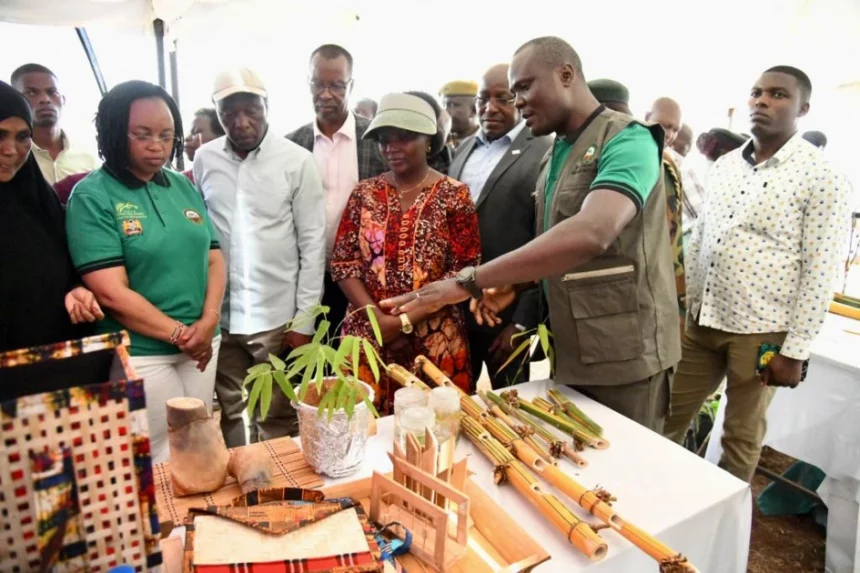The Ministry of Environment, Climate Change and Forestry has unveiled ‘0800724570’ as the 24-hour toll-free number for reporting illegal forest activities including logging and charcoal burning in the country.
Speaking on Monday at Kanyonga in Kyeni South, Embu County during celebrations to mark this year’s World Bamboo Day, Forestry Principal Secretary Gitonga Mugambi said the hotline is managed by a dedicated office in his department.
“We have set up a new office that is dealing with cases of illegal logging in our public forests, and as Government, we will not hesitate in taking action against those caught violating the law,” Mugambi said while rallying wananchi to report suspected illegal forest activities through the hotline.
At the same time, the PS decried escalating illegal logging in parts of the country saying it is regrettable that while Kenyans were accelerating efforts to raise the country’s forest cover to 30 per cent by the year 2032 through the 15 billion tree-growing programme, unscrupulous timber traders are engaged in illegal logging of public forests.
“We will not tolerate continued destruction of our public forests while at the same time encouraging Kenyans to grow 15 billion trees as directed by His Excellency the President,” Mugambi cautioned.
He named Narok, Nakuru, Nyeri, Meru, Nyandarua, Uasin Gishu and Baringo as some of the counties that are highly affected by illegal logging.
On the cultivation of bamboo, Mugambi said the species has been identified as a key enabler of the 30 per cent national tree cover programme because of its fast growth and immense socioeconomic as well as environmental and climate action benefits including high carbon sequestration capabilities.
“We are therefore working towards promoting investments in commercial bamboo production, institutional strengthening, value chain promotion and development, publicity, awareness and education so that stakeholders fully understand the full value of bamboo as an investment.”
“In this regard, my Ministry targets to establish 150,000 hectares of bamboo in the country,” Mugambi said in a speech read on behalf of Environment, Climate Change and Forestry Cabinet Secretary Hon Soipan Tuya at the celebration attended by top Embu County leadership led by Governor Cecily Mbarire.
The PS said bamboo, which was classified as a cash crop by parliament in September 2020, “forms an integral part of the forest sector in Kenya because of its vital ecosystem benefits to communities surrounding water catchment areas, wetlands, forested and agricultural landscapes”.
Occurring in over 1,600 species, bamboo mostly grows in Africa, Asia and Latin America.
The grass was introduced in Kenya by the Kenya Forestry Research Institute (KEFRI) in 1984. Its uptake has however been slow largely due to a lack of adequate seedlings and gaps in its value chain.
“Bamboo propagation has been tedious and mostly through cuttings and also through importing seeds from Asia which has made it impossible to grow bamboo commercially. We are proud to inform you that KEFRI has made breakthroughs in propagating bamboo through tissue culture which will greatly enhance mass propagation of bamboo and reduce seedling costs,” Mugambi announced.
“While bamboo uptake has been slow across the country, its cultivation by the private sector is encouraging. The enthusiasm shown by farmers, extension workers and the scientific community has attracted investors who are keen to commercialize bamboo,” he added.
In her address, Governor Mbarire assured PS Mugambi of her County’s active involvement in sustained tree-growing activities in support of the Kenya Kwanza administration’s 15bn national tree-growing flagship project.
The Governor said Embu County will continue collaborating with the national government and partners in the tree-growing initiative by among other interventions, propagating adequate seedlings to enable it meet its target of planting 14 million trees annually over the next 10 years.
Other speakers at the event included Embu Deputy Governor Kinyua Mugo, Mbeere South MP Eng Nebart Muriuki and acting KEFRI Director General Dr Jane Njuguna.



